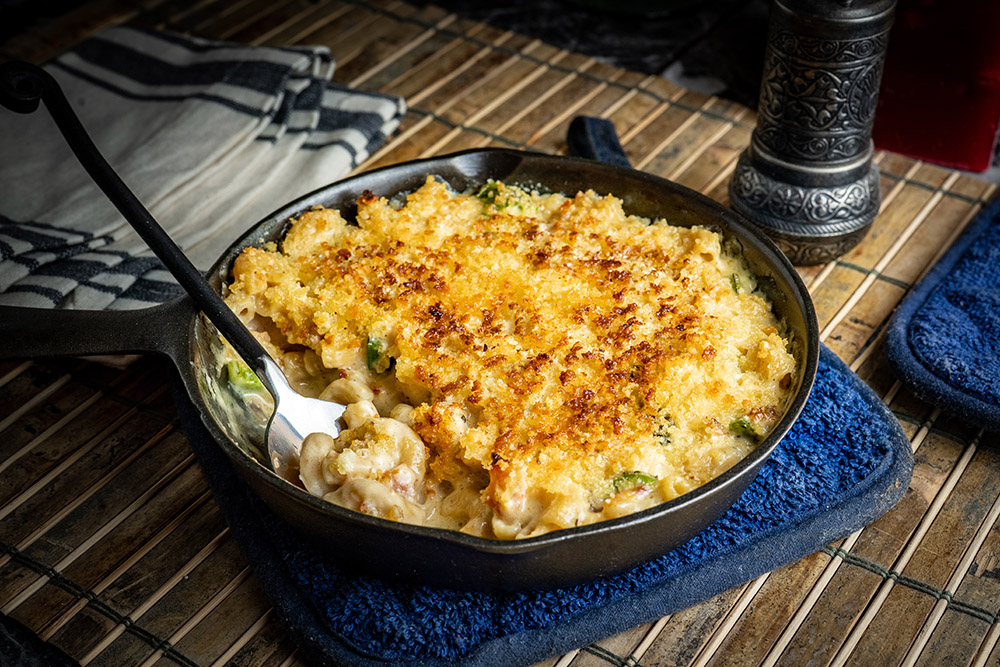Mac and Cheese
by Jon Sullivan - 2022-04-25 - Opinion
<<<<< previous blog next blog >>>>>
In which Jon uses a distorted view of Keynesian economics to justify eating some diet destroying pasta and cheese sauce.
 I was thinking recently about the concept of angst. Which led me to Soren Kierkegaard. Which led me to his idea that anxiety was better than certainty. Since if you replace all anxiety with certainty you remove any chance for options and possibilities. Which led me to his ancillary idea that Christian faith inherently includes doubt. Which led me to conclude Kierkegaard was too smart for his own good, and I remembered I found him pretty ridiculous.
I was thinking recently about the concept of angst. Which led me to Soren Kierkegaard. Which led me to his idea that anxiety was better than certainty. Since if you replace all anxiety with certainty you remove any chance for options and possibilities. Which led me to his ancillary idea that Christian faith inherently includes doubt. Which led me to conclude Kierkegaard was too smart for his own good, and I remembered I found him pretty ridiculous.
But it did lead me to reading up on game theory. And in particular, the prisoner's dilemma thought experiment. And especially the conclusion that in iterative runs of the choices, everyone's best option is to cooperate. But since one bad apple will inescapably ruin the outcome for everyone else, the only rational best interest choice is to not cooperate (betray) once one such bad actor is found. Obviously you can't extrapolate that to all economic choices. Sure, we are all marginally worse off if one dipshit doesn't pay taxes, since we all need to collectively pay their share for them. But the prisoner's dilemma doesn't apply since there is no option for us ALL to not pay taxes.
And it was that sort of example that led me to go down the rabbit hole regarding the application of prisoner's dilemma logic to the debate over Keynesian vs. free market economic theory. In specific, arguments about tickle-up vs trickle-down tax policy and government spending. And here the previously mentioned tax prisoner's dilemma tax example is somehow playing out in real life. If billionaires don't pay taxes via various shenanigans, common wage earners don't have a rational option to "betray" and not pay taxes as well.
Which led me to wondering how the thought experiment would need to be adjusted if one prisoner's only option is to cooperate, even if they know it's not in their rational best interest. If Trump doesn't pay his taxes, the rest of us must pay them for him. We have no other option. In game or economic theory terms, what do we call that? I don't know, but I'm curious.
Beyond all that...... I think it's easy to assume Trump doesn't pay taxes because it is his rational best interest not to. But I don't think that's true. Irregardless of whether a billionaire pays more or less taxes, they are still a billionaire. It wouldn't be a rational best interest choice because neither "choice" would lead to a change in outcome. Or would it...?
If the 1000 or so billionaires in the US paid more taxes, they'd still all be billionaires. But the rest of us would get perks like free healthcare, better schools, less debt, increased GDP, on and on. Which would then create more billionaires. More taxes on billionaires leads to more billionaires. That's my thesis.
Which brings us back to the prisoner's dilemma. And my conclusion that the rational best-interest choice for billionaires is to pay more taxes.
At this point my brain reached it's limit and I made myself some comforting mac and cheese. Irish sharp cheddar, bacon, charred jalapeno, and caramelized onions.
<<<<< previous blog next blog >>>>>News
Recent Posts
I don't remember where I heard it, but this stuck with me - "Social media is a weapon we point at ourselves."
- 2025
It's been an interesting year. A year of change. A year of loss. A year of anxiety. A year of struggle.
- The Tie Dye Problem
Several months ago I started working on a blog post about tie dye. I should finish that so I can get on with my life.
- GBB Fest IX
Garcia Birthday Band just finished up their annual music festival. I was there.
- The Fermi Paradox
We know there are billions of earth-like planets around us. Finding civilizations beyond Earth should be easy.
- Come together
One of the luckiest things to happen to me in the last few years has been new a understanding regarding community.
- The Happiness Problem
I haven't blogged in a while. Not that I have nothing to say. But being happy as civilization crumbles is complicated.
Old School Blogroll
Home of fine hypertext products.
•MetaFilter
A community weblog.
•A Chicken Is Not Pillage
You forgot his exclamation point! It defines him. He put it there for a reason, to show how in! your! face! he is.
•jessamyn.com
abada abada - twenty years of jessamyn
•Matt Haughey
A Whole Lotta Nothing
•dooce
Heater, Mother Of Lance
•Anil Dash
A blog about making culture. Since 1999.
•Some Bits
Nelson's weblog
•Everlasting Blort
proud member of the reality-based community
•Whatever
This machine mocks fascists
•Scripting News
It's even worse than it appears.
•Flutterby
Short attention spans in a world full of flowers
•mimi smartypants
Seriously, though: what's with the penguins?
•Montreal City Weblog
•Stupid Evil Bastard
What the fuck is wrong with you people?
•Idle Words
brevity is for the weak
•Making Light
Say what you mean. Bear witness. Iterate.
•wilwheaton.net
50,000 Monkeys at 50,000 Typewriters Can't Be Wrong
•Justin Hall
Growing & breaking down since 1994
•Mike the Mad Biologist
Helping idiots who desperately need my assistance by calling them fucking morons since 2004
•jwz
•MSSV
•AKMA’s Random Thoughts
Ruminations about hermeneutics, theology, theory, politics, ecclesiastical life… and exercise.
•things magazine
An occasional weblog about objects, collections and discoveries
•Miscellaneous Heathen
Hold to the now, the here, through which all future plunges to the past.
•kimberussell.com
where it's always Virgo Season
•Cockeyed







